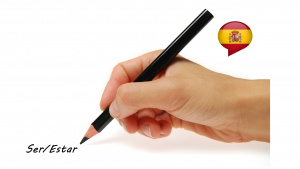Difference between revisions of "Language/Spanish/Grammar/How-to-use-Ser-o-Estar-(verb-to-be)"
Jump to navigation
Jump to search
| Line 1: | Line 1: | ||
[[File:Spanish-to-be.jpg|thumb]] | [[File:Spanish-to-be.jpg|thumb]] | ||
<div style="font-size:300%;">How to use Ser and Estar?</div> | |||
In Spanish the verb "to be" have two meanings, And it may be difficult at first, but don't worry it's nothing out of this world. | In Spanish the verb "to be" have two meanings, And it may be difficult at first, but don't worry it's nothing out of this world. | ||
Revision as of 19:26, 19 September 2018
How to use Ser and Estar?
In Spanish the verb "to be" have two meanings, And it may be difficult at first, but don't worry it's nothing out of this world.
Ser
This word it is used to attribute to the subject of the sentence a quality or condition of his own, for example
"Yo soy Gary."
"Él es Profesor."
"Ustedes son altos."
This word change with the pronoun and it stays like this
| Presente | Pronoun | Simple Present | |
|---|---|---|---|
| Yo | Soy | I | Am |
| Tú | Eres | You | Are |
| Él / Ella | Es | He | Is |
| Nosotros | Somos | We | Are |
| Ustedes | Son | You | Are |
| Vosotros | Sois | You | Are |
| Ellos / Ellas | Son | They | Are |
| Eso / Esto | Es | It | Is |
Also changes when used in the all the verbal timesː
| Pasado Simple | Pretérito Imperfecto | Futuro | Pronound | Simple Past | Future | |
|---|---|---|---|---|---|---|
| Yo | Fui | Era | Seré | I | Was | Will be |
| Tu | Fuiste | Eras | Serás | You | Were | Will be |
| El / Ella | Fue | Era | Será | She / He | Was | Will be |
| Nosotros | Fuimos | Eramos | Seremos | We | Were | Will be |
| Ustedes | Fueron | Eran | Serán | You | Were | Will be |
| Vosotros | Fuisteis | Erais | Seréis | You | Were | Will be |
| Ellos / Ellas | Fueron | Eran | Serán | They | Were | Will be |
| Eso / Esto | Fue | Era | Será | It | Was | Will be |
Estar
- To exist, to locate a person or thing in a place, situation, condition, etc. Eg: Estoy feo, estoy viudo, estoy en Canadá, estoy encerrado.
- Staying a certain time in a place, in a situation. Eg: Estuvo aquí toda la tarde
- To be, to feel, to be in a certain way. It is constructed with passive adjectives or expressions expressing feelings, sensations, etc. And with adverbs so. Eg: Estoy triste, estoy bien, estoy cansado.
- To be such a day or date, or such month. Eg: Estamos a martes, Estamos a 3 de marzo
- Have some price. Eg: ¿Cuánto está el kilogramo de cebollas?
|
Presente |
Pasado | Pretérito imperfecto | Futuro | |
|---|---|---|---|---|
| Yo | Estoy | Estaba | Estuve | Estaré |
| Tu | Estás | Estabas | Estuviste | Estarás |
| El / Ella | Está | Estaba | Estuvo | Estará |
| Nosotros | Estamos | Estábamos | Estuvimos | Estaremos |
| Ustedes | Están | Estaban | Estuvieron | Estarán |
| Vosotros | Estáis | Estabais | Estuvisteis | Estaréis |
| Ellos / Ellas | Están | Estaban | Estuvieron | Estarán |
